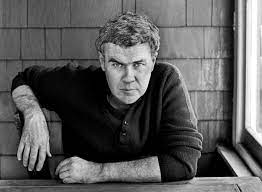
Raymond Carver is one of those open-the-door-and-come-on-in poets. Better known as a short story writer who reached his glory days in the 80s, Carver wrote poems that specialized in narratives, which should come at no surprise, given his start.
What do I mean by “open the door and come on in”? I mean his poems are welcoming and hospitable. He inspires would-be poets and poets alike by making it look easy. Look for rhyme and meter at your own risk.
As for line breaks and enjambment, each functions nicely without the use of punctuation. Many unpunctuated poems trip readers up. Carver’s? Not so much. It’s too easy, smooth, intuitive.
Topic-wise, Carver was easy listening, too. Everyday life was his topic, whether by fiction or by verse. In a 1988 interview (he died of lung cancer that year on Aug. 2nd), he said, “Most of my stories, if not all of them, have some basis in real life. That’s the kind of fiction I’m most interested in. I suppose that’s one reason I don’t have much respect for fiction that seems to be game playing.”
It should come as no surprise, then, that Carver idolized Anton Chekhov. It should also come as no surprise that Carver fashioned a poem from the moment his doctor told him about his cancer.
It looks simple, reading it. Dialogue without the quotation marks. Doctor and patient, back and forth in a frank manner, ending with a finish where “habit” forces the patient to act in a manner that’s unexpectedly casual, given the gravity of the situation.
But unexpectedly casual is what makes the poem work. Bittersweet and poignant, it’s a gut punch moment made all the more realistic by the speaker’s final act in the final line.
Check and see for yourself. If you’re inspired by this relative ease of Carver’s poetry writing, try a dialogue crowned by action/thought/contrast poem yourself.
You’ll see just how difficult “simple” can be!
What the Doctor Said
Raymond Carver
He said it doesn’t look good
he said it looks bad in fact real bad
he said I counted thirty-two of them on one lung before
I quit counting them
I said I’m glad I wouldn’t want to know
about any more being there than that
he said are you a religious man do you kneel down
in forest groves and let yourself ask for help
when you come to a waterfall
mist blowing against your face and arms
do you stop and ask for understanding at those moments
I said not yet but I intend to start today
he said I’m real sorry he said
I wish I had some other kind of news to give you
I said Amen and he said something else
I didn’t catch and not knowing what else to do
and not wanting him to have to repeat it
and me to have to fully digest it
I just looked at him
for a minute and he looked back it was then
I jumped up and shook hands with this man who’d just given me
something no one else on earth had ever given me
I may have even thanked him habit being so strong
